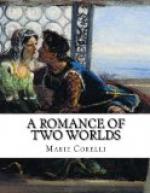Raffaello Cellini still lives and works; his paintings are among the marvels of modern Italy for their richness and warmth of colour— colour which, in spite of his envious detractors, is destined to last through ages. He is not very rich, for he is one of those who give away their substance to the poor and the distressed; but where he is known he is universally beloved. None of his pictures have yet been exhibited in England, and he is in no hurry to call upon the London critics for their judgment. He has been asked several times to sell his large picture, “Lords of our Life and Death,” but he will not. I have never met him since our intercourse at Cannes, but I hear of him frequently through Heliobas, who has recently forwarded me a proof engraving of the picture “L’Improvisatrice,” for which I sat as model. It is a beautiful work of art, but that it is like me I am not vain enough to admit. I keep it, not as a portrait of myself, but as a souvenir of the man through whose introduction I gained the best friend I have.
News of Prince Ivan Petroffsky reaches me frequently. He is possessor of the immense wealth foretold by Heliobas; the eyes of Society greedily follows his movements; his name figures conspicuously in the “Fashionable Intelligence;” and the magnificence of his recent marriage festivities was for some time the talk of the Continent. He has married the only daughter of a French Duke—a lovely creature, as soulless and heartless as a dressmaker’s stuffed model; but she carries his jewels well on her white bosom, and receives his guests with as much dignity as a well-trained major-domo. These qualities suffice to satisfy her husband at present; how long his satisfaction will last is another matter. He has not quite forgotten Zara; for on every recurring Jour des Morts, or Feast of the Dead, he sends a garland or cross of flowers to the simple grave in Pere-la-Chaise. Heliobas watches his career with untiring vigilance; nor can I myself avoid taking a certain interest in the progress of his fate. At the moment I write he is one of the most envied and popular noblemen in all the Royal Courts of Europe; and no one thinks of asking him whether he is happy. He must be happy, says the world; he has everything that is needed to make him so. Everything? yes—all except one thing, for which he will long when the shadow of the end draws near.
And now what else remains? A brief farewell to those who have perused this narrative, or a lingering parting word?
In these days of haste and scramble, when there is no time for faith, is there time for sentiment? I think not. And therefore there shall be none between my readers and me, save this—a friendly warning. Belief—belief in God—belief in all things noble, unworldly, lofty, and beautiful, is rapidly being crushed underfoot by—what? By mere lust of gain! Be sure, good people, be very sure that you are right in denying God for




